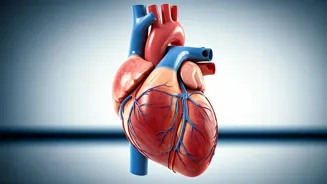Prioritize Heart-Healthy Diet
One of the fundamental strategies for maintaining optimal heart health is to adopt a heart-healthy diet. This involves making informed food choices that
support cardiovascular function. The cornerstone of such a diet includes an emphasis on fruits, vegetables, and whole grains. These foods are rich in essential nutrients, vitamins, and minerals that are vital for overall health and help in reducing the risk of heart disease. Furthermore, limiting the intake of saturated and trans fats is critical. These types of fats can elevate LDL cholesterol levels, often referred to as "bad" cholesterol, which contributes to the buildup of plaque in arteries, a condition known as atherosclerosis. It's equally important to moderate your sodium intake. Excess sodium can lead to high blood pressure, which is a significant risk factor for heart disease. Carefully reading food labels and being mindful of portion sizes will help maintain a balanced and heart-conscious diet. Also, incorporating lean proteins, such as fish and poultry, is beneficial. Fish, especially fatty fish like salmon, is rich in omega-3 fatty acids, known for their protective effects on the heart. Choosing these protein sources over red and processed meats will contribute to a heart-healthy eating plan.
Embrace Regular Physical Activity
Consistent physical activity is another essential component of a comprehensive heart-healthy lifestyle. Regular exercise offers numerous benefits for cardiovascular health and overall well-being. Aim for at least 150 minutes of moderate-intensity aerobic exercise or 75 minutes of vigorous-intensity exercise each week. Activities like brisk walking, jogging, swimming, or cycling are excellent choices for improving cardiovascular fitness. Exercise helps lower blood pressure, regulate cholesterol levels, and strengthen the heart muscle. This strengthens the cardiovascular system, making it more efficient at pumping blood throughout the body. In addition to aerobic exercise, incorporating strength training exercises at least two days a week is beneficial. Strength training helps to maintain and build muscle mass, which can boost metabolism and aid in weight management. Engaging in regular physical activity has been associated with a decreased risk of various heart diseases, including heart failure and coronary artery disease. It also helps reduce the risk factors like obesity, high blood pressure, and type 2 diabetes, all of which can negatively impact heart health. Find activities you enjoy to make exercise a sustainable part of your routine, helping you stay consistent and motivated.
Manage Stress Effectively
Stress management is a crucial aspect of heart health, as chronic stress can significantly impact cardiovascular function. When the body experiences stress, it releases hormones like cortisol, which can raise blood pressure and contribute to other harmful effects. Practicing relaxation techniques is an effective way to counteract the negative impacts of stress. Activities such as meditation, deep breathing exercises, and yoga can help calm the mind and reduce stress levels. They promote relaxation, helping to lower blood pressure and heart rate. Engaging in activities you find enjoyable, such as hobbies or spending time with loved ones, is another way to manage stress and improve overall mental well-being. Maintaining a healthy work-life balance is also important, setting clear boundaries to prevent burnout and maintain emotional stability. Prioritizing sufficient sleep each night is essential for stress management, as sleep deprivation can exacerbate stress levels and negatively affect heart health. Seeking professional help, such as therapy or counseling, can be beneficial for managing stress and addressing any underlying emotional issues.
Monitor Cholesterol and Blood Pressure
Regular monitoring of cholesterol and blood pressure levels is essential for proactively managing heart health and mitigating the risks of cardiovascular disease. High cholesterol and high blood pressure are major risk factors that can significantly increase the likelihood of heart attacks and strokes. Regularly check your blood pressure at home or during medical appointments to detect any early warning signs. Maintain regular check-ups with your healthcare provider to monitor cholesterol levels. If levels are elevated, they can provide guidance on lifestyle modifications or medication. Lifestyle changes such as diet and exercise can positively impact cholesterol and blood pressure levels. Following a heart-healthy diet can help lower LDL cholesterol and maintain healthy blood pressure. Exercise can help in managing both blood pressure and cholesterol. Reducing sodium intake, maintaining a healthy weight, and avoiding smoking and excessive alcohol consumption are other lifestyle adjustments that can aid in managing these vital health metrics. Proactive monitoring, combined with lifestyle adjustments, allows you to detect and address issues early on.
Avoid Smoking and Limit Alcohol
Avoiding smoking and limiting alcohol consumption are critical steps in promoting heart health. Smoking has a detrimental impact on the cardiovascular system, damaging blood vessels and increasing the risk of heart disease, stroke, and other serious conditions. Nicotine constricts blood vessels and increases blood pressure, while other chemicals in cigarette smoke damage the lining of arteries, leading to plaque buildup. Quitting smoking is one of the most significant steps you can take to improve heart health. If you smoke, seek support from healthcare providers or support groups to help you quit successfully. Excessive alcohol consumption can also negatively impact heart health. Regularly drinking large amounts of alcohol can raise blood pressure, contribute to weight gain, and increase the risk of heart failure and stroke. If you drink alcohol, do so in moderation. This typically means no more than one drink per day for women and up to two drinks per day for men. Making these lifestyle choices and seeking support when needed will significantly improve your heart health.




















